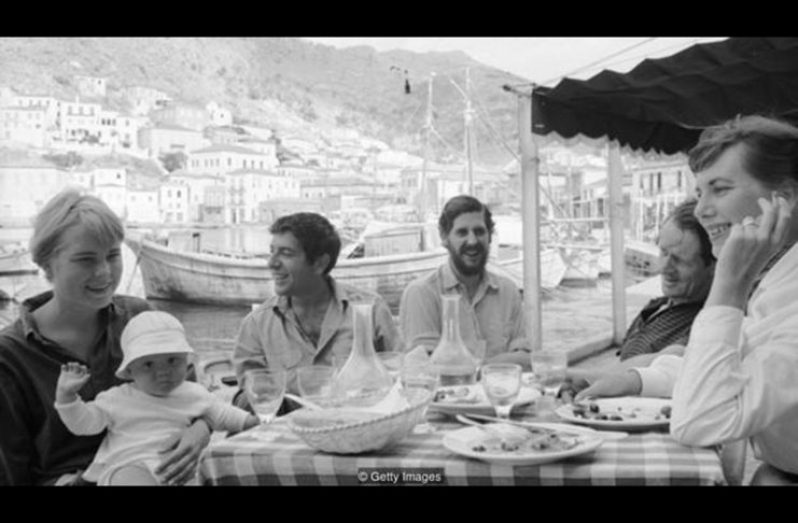The Canadian singer and song-writer had a reputation as ‘the godfather of gloom’. But that was a nickname he spurned, says Arwa Haider.
I didn’t kill myself
when things went wrong
I didn’t turn
to drugs or teaching
I tried to sleep
but when I couldn’t sleep
I learned to write
I learned to write
what might be read
on nights like this
by one like me
(from Leonard Cohen’s poem Marita, Please Find Me, I Am Almost 30)
Canadian poet and singer-songwriter Leonard Cohen had long proved his power to make

grown men and women cry, before his widely mourned death this week, aged 82. Cohen’s reputation as ‘the high priest of pathos’ stemmed from his rich catalogue, spanning 1960s poetry and 21st-Century songs: his recently released 14th album, You Want It Darker, won praise for its moody strength. The spiritual tone of Cohen’s work was sealed by his unmistakably deep and battle-grizzled vocals – but it was also rooted in genuine faith: his Jewish heritage and Buddhist practice. The so-called ‘godfather of gloom’ openly tired of such nicknames, his bleakest expressions spiked with a sharp wit and his most melancholy melodies lifted by surprising end-notes. In an interview with BBC Radio 2, he said: “You get tired, over the years, hearing that you’re the champion of gloom.”
The ‘prince of darkness’ refused to linger in the shadows. In his 1992 track Anthem, Cohen famously intoned: “There is a crack in everything, that’s how the light gets in”. His openness about personal challenges, from rejection to a long-standing depression, created a life-affirming kind of warmth and empathy, and a heightened intimacy even when he was playing to mass audiences. High-profile fans such as Bob Dylan have admired this quality: “I see no disenchantment in Leonard’s lyrics at all,” Dylan told the New Yorker. “There’s always a direct sentiment, as if he’s holding a conversation and telling you something, him doing all the talking, but the listener keeps listening.”
Cohen never sounded afraid to rip his heart out or reveal ugly truths in classics such as 1988’s Everybody Knows (“Everybody knows that the war is over/ Everybody knows that the good guys lost”). Yet there has always been an elegance to his murkiest lines, and ultimately, a sweet resilience. Interviewed by British singer-songwriter Jarvis Cocker in 2012, Cohen explained: “when things get really bad, you just raise your glass and stamp your feet and do a little jig, and that’s all you can do”.
Sunny side up
In the same interview, Cohen cited Zorba the Greek as an inspiration: an unusual reference, perhaps, but not an entirely unexpected one, given the sun-drenched Greek island retreat that the artist had bought when he was 26. Cohen’s natural habitat was in the sunshine, as his son Adam fondly explained in the 2016 essay collection My Old Man: Tales Of Our Fathers: “He will find a patch of sun and sit in it, like a big cat, following that sliver wherever it goes.” By his late 60s, Cohen had also found an inner peace in his own kind of style, residing in a Californian Zen Buddhist retreat (but maintaining his love of coffee and, back then, cigarettes, happily describing himself as “a sloppy monk”).
Cohen’s humour and self-deprecation have sometimes been overlooked. In the same essay, Adam said: “There was always laughter. Despite his notoriety for, I quote, ‘having a voice like the bottom of an ashtray’, for being ‘the prince of darkness’, for being famed for his lugubriousness, he is one of the most quick-witted men, and he is generous with his humour. The guy is hilarious.” That humour has shot through countless works in his catalogue; take the ice-cold romantic ripostes of One Of Us Cannot Be Wrong from his 1967 debut album, or his lines about a fling with Janis Joplin on Chelsea Hotel No. 2 (1974):
You told me again you preferred handsome men
but for me you would make an exception
And clenching your fist for the ones like us
who are oppressed by the figures of beauty,
you fixed yourself, you said, ‘Well never mind,
we are ugly but we have the music’
There was always a power in being an outsider, and a kind of rapture in the fall – perfectly captured in the much covered Hallelujah (originally released on Cohen’s 1984 album Various Positions). Talking to BBC’s Stuart Maconie, Cohen said: “The word ‘hallelujah’, of course, is so rich – it’s so abundant in resonances. It’s a wonderful word to sing, and people have been singing that word for thousands of years. It seems to call down some kind of beneficial energy… in the face of the kind of catastrophes that are manifesting everywhere, to say ‘hallelujah’ – to praise the energy that manifests both as good and evil, just to affirm our little journey here. It’s very invigorating to sing that word.”
Even in his last decades, he transformed personal trauma into triumph; his hugely successful 21st-Century return to the fray was prompted by financial struggles after his former manager and lover stole millions of dollars from his accounts.
More than anything, Cohen faced mortality with beauty – and perhaps this became more apparent than ever in his final year. At the recent funeral for his old flame and muse Marianne Ihlen, Cohen read his incredibly affecting farewell letter to her: “Know that I am so close behind you that if you stretch out your hand, I think you can reach mine”.
Cohen summoned the most heart-wrenching passions in his music and poetry, yet his refuge for tortured souls was also a place of redemption, and ultimately, peace. “I’ve always been into self-dramatisation,” he told an LA playback party for his latest album, a few weeks ago. “I intend to live forever.” (BBC)




.png)









